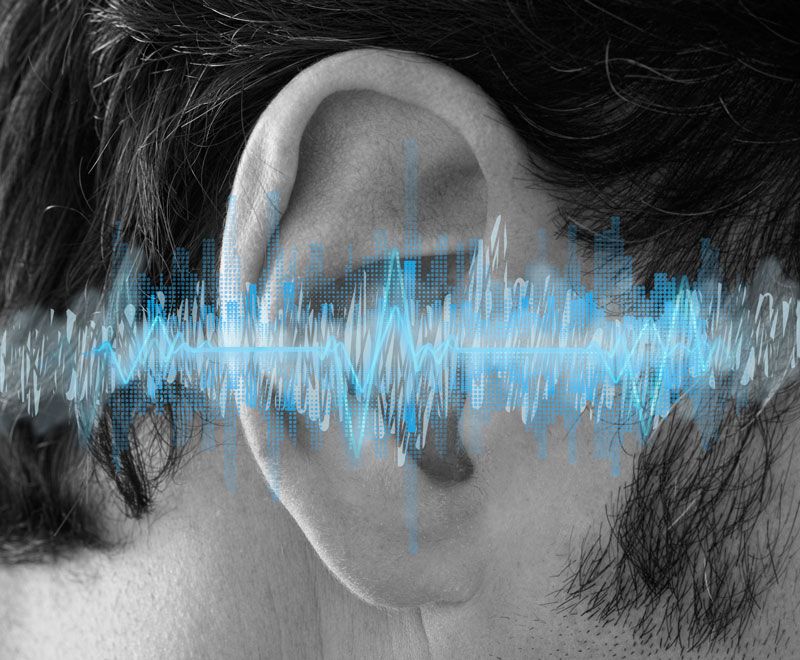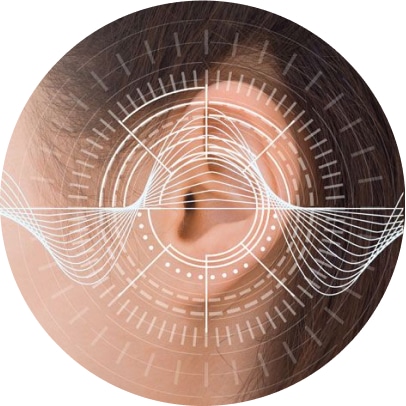Tinnitus Symptoms Are Manageable – We Can Help
If you’re experiencing tinnitus, you might feel like it’s all in your head. While that’s technically correct—in most forms of tinnitus, the sound is only audible to you, but that doesn’t mean you have to deal with it on your own. Our team at Nelson Hearing Clinics can help you manage your tinnitus to reduce its impact on your daily life.
What Is Tinnitus?
Tinnitus is a noise heard in one or both ears that might be constant or come and go. It can last anywhere from a few days to years. Ringing is one of the most common sounds, but tinnitus can also manifest as buzzing, roaring, clicking, hissing, humming – even music! In extreme cases, it might interfere with your ability to concentrate or lead to anxiety.
What Causes Tinnitus?
The following can potentially lead to tinnitus:
- Presbycusis (age-related hearing loss)
- Consistent exposure to loud noise
- Impacted earwax
- Otosclerosis (stiffening of the bones in the middle ear)
- Meniere’s disease
- TMJ disorders
- Ototoxic medications (some medications can be harmful to the ear)
- Thyroid conditions
- Head or neck trauma
- Acoustic neuromas
Types of Tinnitus
The most common form of tinnitus is subjective tinnitus or tinnitus that only you can hear. This type of tinnitus often sounds like ringing or buzzing.
Less frequently diagnosed is pulsatile or objective tinnitus, which sounds like a whooshing or pulsing sound. A practitioner may be able to hear pulsatile tinnitus during an examination.


What Happens During a Tinnitus Evaluation?
Tinnitus is typically diagnosed based on a patient’s symptoms. To determine an underlying cause, our audiologists will ask many questions regarding your tinnitus; what it sounds like, how it affects you, when did you first hear it, does it affect your ability to hear, etc. A medical history will also be taken, and your current medications will be reviewed. A variety of tests will be performed, which will provide important information about your tinnitus and overall ear health. This extensive testing allows a treatment plan to be customized specifically for you.
Other common tests include:
- Hearing exam: In a quiet room, you will be connected to a device that sends sounds to one ear at a time. You’ll be asked to press a button or raise your hand whenever you hear a sound.
- Speech testing: done both in quiet and in noisy environments, this testing will determine if your tinnitus is interfering with your ability to understand speech and if noise affects your ability to understand speech clearly.
- Movement: If the tinnitus changes due to certain movements, it might identify another disorder in need of treatment.
- Tinnitus loudness and pitch matching: helps determine the actual sound you are hearing in your ears. Both the pitch and volume of the noise you hear are used to determine treatment options.
- Questionnaires: determines the impact of tinnitus on your daily life, including your ability to sleep, relax and concentrate.
Ways of Managing Tinnitus
While there currently is no cure for tinnitus, there is still hope! Our treatment options can significantly lower the perceived burden and intensity of tinnitus. In fact, 80% of patients report a decrease in their tinnitus within two weeks of starting treatment. The vast majority of tinnitus patients will benefit from the following management options:
- Sound therapy: This involves using various sounds to lower the perception of tinnitus and is one of the most popular treatment options.
- Hearing aids: A majority of tinnitus patients also experience hearing loss. Hearing aids are used to amplify sounds around you, which can mask tinnitus.
- Combination devices: part hearing, part tinnitus masker. These devices treat hearing loss and use additional sounds, like white noise or ocean sounds, to find relief from the tinnitus.
- Counseling: Techniques like cognitive behavioral therapy, or CBT, can help reduce the stress, anxiety and sleeplessness that often arise as a side effect of tinnitus.
- Tinnitus retraining therapy: This option includes both counseling and acoustic therapy. Identifying possible triggers: Avoid certain irritants that can make your tinnitus worse. Some common triggers are exposure to loud sounds, overconsumption of caffeine, alcohol, sodium and nicotine and not enough restful sleep..
- While not common, sometimes testing will show that an underlying medical issue is the root cause of the tinnitus. If this occurs our team will connect you to the right specialist to help manage any medical condition.
Sound Therapy Can Sound However You’d Like It To
A significant element of tinnitus treatment is sound therapy. The goal is to choose sounds that lower the volume of the tinnitus but aren’t intrusive or annoying. Though behind-the-ear wearable devices are one option, a wide array of options are available.
Potential options include:
- White noise
- Smartphone apps
- Fan noise
- Gentle music
- Nature sounds
Counseling Can Provide Additional Support
Counseling can connect you with emotional coping techniques and strategies that will, in turn, help reduce potential side effects of tinnitus, including depression, fatigue and insomnia. By eliminating your anxiety around tinnitus, the noises no longer seem like a danger, and you’ll be able to focus on other things.
How Does Tinnitus Retraining Therapy Work?
Three big elements of tinnitus retraining therapy are:
- An evaluation of your daily habits and history
- Fitting of a noise-generating device that helps reduce the noise you hear
- Counseling to help you learn to manage and ignore tinnitus symptoms
The goal of tinnitus retraining therapy is to teach patients about their condition and ways to change how they react to and perceive the sound of tinnitus, ultimately removing the emotional reaction to it. Sound therapy will help mask the sound, and counseling will reduce the bothersome elements of the noise.


You Aren’t In this Alone
Approximately twelve million Americans suffer from tinnitus in its severest form; millions more are affected to a lesser degree. Here at Nelson Hearing Clinics we understand how tinnitus can impact your life. Our clinic is focused on one goal: the comprehensive evaluation and successful treatment of each individual’s tinnitus, ultimately resulting in a quieter and less stressful life for our patients. Approximately 90% of our patients report a significant improvement in the reduction of their tinnitus. Tinnitus is no longer something you have to learn to live with; it is something you can conquer. We’re here to help.
Call Nelson Hearing Clinics for more information or to schedule an appointment.